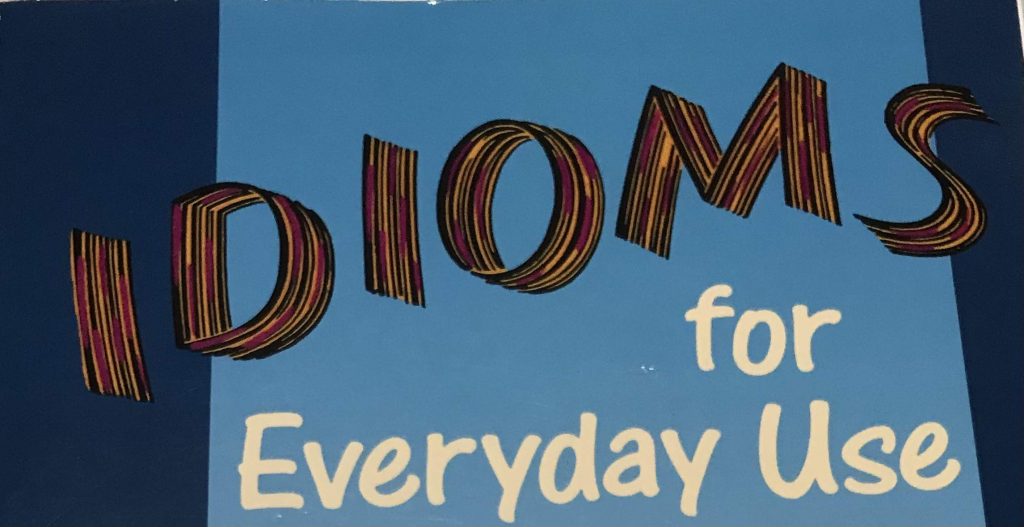
Photo by Black ice from Pexels (I added the expression)
151 HE STOOD HER UP
Ele a deixou esperando
152 CAN YOU BREAK A (HUNDRED)?
Você troca cem?
153 GIVE OR TAKE (MORE OR LESS)
Mais ou menos
154 DON’T TRANSLATE TO THE LETTER
Não traduza ao pé da letra
155 BE MY GUEST! MAKE YOURSELF AT HOME
Fique à vontade
156 24/7 (READ:TWENTY-FOUR SEVEN) SUPERMARKET
Supermercados que não fecham.
157 I WATCHED THE LORD OF THE RINGS BACK TO BACK
Eu assisti os filmes de O senhor dos anéis consecutivamente
158 FOR YOUR SAKE , FOR GOD’S SAKE.
Para o seu bem, pelo amor de Deus
159 STAY PUT
Não sai daí.
160 IT’S MONEY DOWN THE DRAIN
É dinheiro jogado fora
161 STUDYING 30 MINUTES A DAY, MAKES YOU BECOME FLUENT BIT BY BIT.
Estudar 30 minutos por dia faz com que voce fique fluente pouco a pouco
162 ONCE BITTEN, TWICE SHY!
Gato escaldado tem medo de água fria
163 SAME OLD STUFF
Mesma coisa de sempre
164 I DON’T QUITE FOLLOW YOU
Não estou te entendendo
165 I’M NOT IN THE MOOD FOR EXCUSES
Não estou afim de ouvir desculpas
166 LET’S KEEP IT IN PERSPECTIVE
Vamos ver isso de uma outra forma
167 THE WORKS.
Serviço completo
168 LET’S GO FOR A LITTLE STROLL
Vamos dar um passeio
169 I’LL SHOW YOU THE ROPES
Vou te passar o serviço
170 I FIGURED OUT A WAY
Eu descobri/achei um jeito
171 HE MADE CHANGES OVER MY SHOULDER
Ele fez mudanças sem me consultar
172 LET’S START FROM SCRATCH
Vamos começar do zero
173 I WANT TO BRUSH UP ON MY ENGLISH
Eu quero melhorar meu inglês
174 THAT’S OFF THE TABLE
Isto está fora de questão
175 WE HIT IT OFF
Nós nos damos bem
176 NOBODY WILL BE THE WISER
Nobody will find out
177 LITTLE DID I KNOW…
Mal eu sabia…
178 IT’S A SCHOOL NIGHT
Amanhã é dia de trabalho
179 IS ANYTHING THE MATTER?
Algum problema?
180 THAT DOES IT!
Isso já dá! (That completes it)
181 I KNOW THE EXPRESSIONS BY HEART.
Eu sei as expressões decor
182 I HAVE TO MEET THE DEADLINE.
Eu tenho que cumprir o prazo
183 I’LL TAKE A RAIN CHECK.
Vou deixar pra depois
184 LET YOUR HAIR DOWN.
Relaxe
185 SHE WENT POSTAL.
Ela perdeu a cabeça
186 A ROLLING STONE GATHERS NO MOSS.
Pedra que rola não cria limo
187 WE NEVER KNOW WHAT MIGHT LIE IN STORE FOR US.
Nunca sabemos o que nos espera
188 IT IS FOR THE GREATER GOOD!
É para um bem maior
189 SHE WORKS (A)ROUND THE CLOCK
Ela trabalha o tempo todo
190 SHE-CAT / TOM-CAT, HE-CAT
Gata / Gato
191 I’LL PULL OUT ALL THE STOPS
I’LL DO MY BEST
192 I NEED TWO JOBS TO MAKE ENDS MEET.
Preciso de 2 empregos para conseguir pagar as contas do mês
193 HASTE MAKES WASTE!
A pressa é inimiga da perfeição
194 GIVE HIM AN INCH AND HE’LL TAKE A MILE.
Você da a mão e ele quer o braço
195 BEN IS UP AGAINST THE WALL.
Ben is in serious difficulties
196 I HOPE HE DOESN’T GO TO THE PARTY, HE’S SUCH A WET BLANKET.
…(wet blanket) estraga prazeres
197 EASY COME, EASY GO!
Vem fácil, vai fácil.
198 IGNORANCE IS BLISS
A ignorância é uma benção.
199 I DIDN’T KNOW HIS NAME, LET ALONE HIS ADDRESS
Eu não sabia o nome dele, quantos mais seu endereço
200 ARE YOU GETTING THE HANG OF THINGS ?
Você está pegando o jeito?








